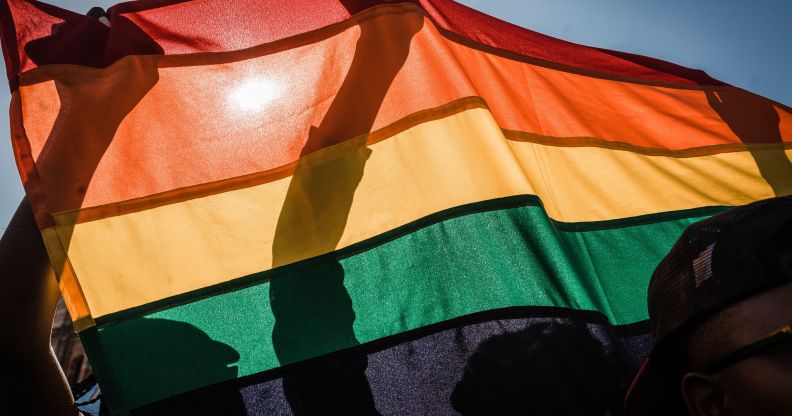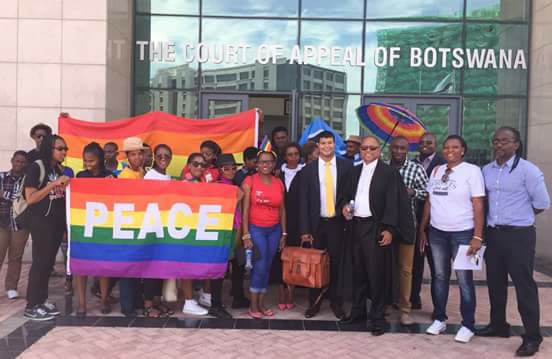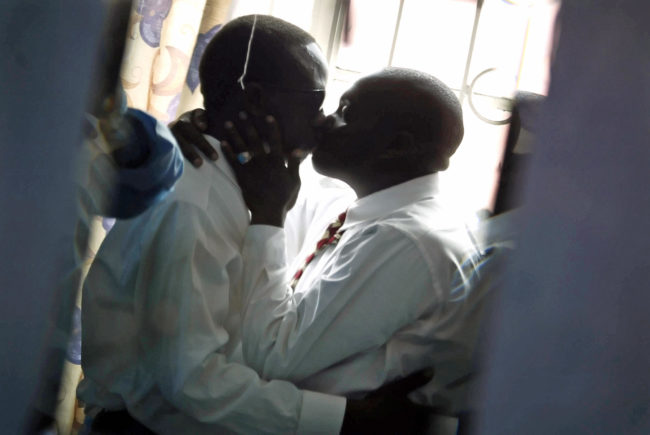Botswana LGBT activists present arguments to decriminalise gay sex

LGBT+ campaigners in Botswana present arguments to the High Court in favour of the decriminalisation of gay sex. (Rajesh Jantilal/AFP/Getty Images)
LGBT activists in Botswana presented arguments in favour of the decriminalisation of gay sex in front of the High Court on Thursday (March 14).
The case under consideration was first filed in May 2018 by a gay man whose name has not been disclosed, Reuters reported.
The hearing is the latest development in the LGBT activists’ long battle to repeal article 164 and article 167 of the Botswana Penal Code, which ban relationships “against the order of nature” and “gross indecency,” punishing such acts with up to seven years in prison.
“Botswana is a diverse society and the constitution protects the freedoms and dignity of all persons in Botswana.”
— LEGABIBO CEO Anna Mmolai-Chalmers
In a statement published ahead of the hearing, the group Lesbians, Gays and Bisexuals of Botswana (LEGABIBO) said it submitted evidence illustrating how the current laws stigmatise the LGBT+ community, hindering their access to basic services, exposing them to the risk of discrimination, and infringing on their basic human dignity.
“Botswana is a diverse society and the constitution protects the freedoms and dignity of all persons in Botswana, regardless of whether you are gay, lesbian, bisexual, transgender or intersex,” said LEGABIBO CEO Anna Mmolai-Chalmers.

LGBT activists have been campaigning for the decriminalisation of gay sex in Botswana for years. (LEBABIBO/Facebook)
Tashwill Esterhuizen, LGBT and sex workers rights programme lawyer at the Southern Africa Litigation Centre, expressed confidence in the court’s ability to acknowledge LGBT rights and provide an example to other courts in the region.
“We are confident and hopeful that the court will uphold the human rights of the LGBTI community,” Esterhuizen said, quoted in the LEGABIBO statement.
In 2017, a High Court landmark ruling ordered the government to legally recognise a transgender man for the first time, enabling him to obtain documents matching his gender identity following a 10-year legal battle.
Botswana LGBT activists not alone in fighting gay sex ban
Botswana is not the only African country where LGBT activists are resorting to fighting bans on gay sex in the courts.
Kenya’s High Court is expected to rule on the constitutionality of three articles in the Penal Code which effectively criminalise gay sex in the country.
The articles under consideration in the High Courts in Kenya and Botswana use similar language, as both countries’ Penal Codes are a legacy of British colonial rule.

Two men are photographed kissing in June 2006 in Nairobi, Kenya. (Tony Karumba/AFP/Getty)
A decision in Kenya was expected on February 22, but judges decided to delay a decision on this case until May 24, 2019.
In the Kenyan case, parties for and against decriminalisation have been allowed to refer to the case that led to the decriminalisation of homosexuality in India—first criminalised under British rule—in September as part of their submissions before the High Court.
Some 70 countries or territories around the world retain laws—usually inherited by colonial powers such as Britain and France—punishing homosexuality or gay sex.
Angola is believed to be the first country to have decriminalised homosexuality so far this year.

